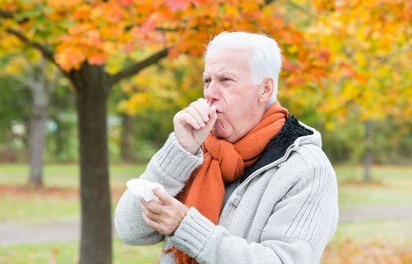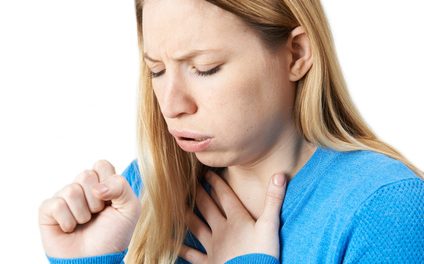Coughing and Spitting Up Blood (Hemoptysis) or Bloody Mucus
How Can the Blood Appear in the Mouth?
Blood in the mouth can originate from the mouth, throat and any part of the airway (nose, paranasal sinuses, voice box, windpipe, bronchi), lungs or upper gut (esophagus or stomach). The presence of blood in the mouth is not always a cause for concern. However, coughing up blood is a serious symptom and medical attention is necessary if it is frequent or persistent and occuring without any identifiable cause (for example a blow to the mouth).
Terms Explained
There are several medial terms that describe the presence of blood in the saliva, vomitus or sptum.
- Phlegm, medically sputum, refers to mucus coughed up from the lower airways: voice box, windpipe, bronchi or lungs.
- Hemoptysis (Greek haima = blood; ptysis = spitting) refers to spitting up blood that originated in the lungs or bronchi.
- Hematemesis (greek haima = blood; emesis = vomiting) refers to vomiting blood originated in the gullet (esophagus) or stomach.
What is hemoptysis?
Hemoptysis or haemoptysis (UK) is the term for coughing up blood. This may vary from blood-streaked sputum to expectoration of bright red blood with no mucus discharge. The term hemoptysis is not defined by the amount of blood that is expectorated but rather by the presence of bleeding that usually originates from the airways or lungs. In some cases, blood in the mouth may be the only evident symptom apart from occasional coughing.

With certain causes like pneumococcal pneumonia, a rust colored sputum may be the only indication of hemoptysis. Read more on sputum color and types of sputum. It is not uncommon for bleeding from the mouth, nasal cavity or gastrointestinal tract to be mistaken for hemoptysis. However, it is important to note that bleeding gums, a nose bleed and blood in the vomit are not the same as coughing up blood (hemoptysis).
Hemoptysis originates fom the airways and lungs. The lining of the airways and lungs is very thin and any injury can cause bleeding. With most acute conditions, this may be microscopic or even absent but in chronic respiratory diseases and those conditions that results in extensive damage, hemoptysis may present as coughing up blood streaked mucus or even overt hemorrhage (frank hemoptysis).
Signs and Symptoms
Hemoptysis is an indication of pathology in the respiratory tract. It is often associated with cancer and tuberculosis but there are various other causes that may also be responsible. The presence of other signs and symptoms provides a better indication of the possible cause. It is also important to note the duration and frequency as both acute and chronic conditions may lead to hemoptysis. Some of the other symptoms that may be seen with certain causes of hemoptysis includes :
- Fever and night sweats (tuberculosis, pneumonia – fever without night sweats)
- Unintentional weight loss (tuberculosis or cancer)
- Clubbing (bronchiectasis or cancer)
- Skin rashes (vasculitis, HIV)
Causes of Hemoptysis
Cancer
Lung cancer with or without spread to the bronchi may cause hemoptysis. Benign tumors like a bronchial adenoma may also be responsible.
Infections
Acute respiratory tract infections may lead to blood-streaked mucus although frank hemoptysis only tends to occur with chronic infections like tuberculosis, actinomycosis and suppurative pneumonia. Hempotysis may also occur with a lung abscess. Fungal infections like pulmonary aspergilloma (mycetoma) and parasites like flukes.
Trauma
Any chest trauma that leads to hemoptysis needs to be investigated immediately. Foreign bodies may include inhaled objects that usually lodges in the airways and is more frequently seen in children. Iatrogenic causes include trauma following diagnostic procedures like a bronchoscopic biopsy.
Cardiovascular
Cardiovascular causes of hemptysis includes :
- left ventricular failure (acute)
- mitral valve disease
- pulmonary infarction
- vasculitis – Wegener’s granulomatosis
- aortic aneurysm
Blood Disorders
Blood-related disorders that may cause hemoptysis includes :
- leukemia
- hemophilia
The use of anticoagulants may also be responsible for hemoptysis particularly if a respiratory tract condition arises, which on its own may not be associated with hemoptysis.
Finding the Cause of Coughing Up Blood from Symptoms
A person, spitting up blood, may suspect its origin from accompanying symptoms:
- In a smoker, coughing up thick phlegm with blood, chronic bronchitis and lung cancer should be considered.
- A person with chronicly blocked nose and spitting up blood can have polyps or cancer in the nose or paranasal sinuses.
- Low grade fever, night sweats, malaise and coughing up blood , lasting several weeks to months can be symptoms of tuberculosis. Symptoms lasting few days to weeks may be from acute bronchitis.
- High fever, rapid breathing and heartbeat, chest pain and frothy bloody mucus can be from bacterial pneumonia.
- A person with deep vein thrombosis, experiencing sudden chest pain, low-grade fever and difficulty breathing can have pulmonary embolism.
Not Every Red Spittle Contains Blood
Apart from the blood, the following may stain spit red:
- Red colored foods, like beetroot, candy, artificially colored drinks and wine.
- Saliva of patients with asthma can appear pink, if it contains large amount of eosinophils (a type of blood cells).
Bleeding from the Mouth and Throat
Bleeding from the mouth may be due to:
- Injuries: Often occurs with everyday events teeth brushing, tooth extraction, blow to the mouth and foreign objectsin the mouth.
- Dry mouth
- Mouth sores
- Periodontosis: This is an infection of gums with detached gums and loose teeth. The main cause is poor mouth hygiene.
- Oral cancer: This is a malignant (cancerous) tumor appearing anywhere in the mouth. Alcoholism, tobacco chewing and smoking are the main risk factors.
- Mouth infections: Herpes simplex virus, shingles, measles and oral thrush (candida yeast infection)
- Ingestion of corrosive fluids, like acids or petrol, may cause severe damage and bleeding from the mouth, throat, esophagus and stomach mucosa.
- Poisoning: Lead poisoning, arsenic poisoning or mercury poisoning may cause bleeding gums.

Disorders that can cause bleeding in the mouth, nose, throat or heavy menstrual bleeding at the same time:
- Viral hemorrhagic fevers
- Vitamin C deficiency (scurvy): Mainly occurs in chronic alcoholism or other cause of inadequate vitamin C intake. Symptoms include skin bruises and bleeding gums.
- Malnutrition: Mainly due to starving, alcoholism or malabsorption. It can lead to weight loss, fatigue and skin, nose or mouth bleeding.
- Low blood platelets (thrombocytopenia): Arises with blood diseases, like leukemia, chemotherapy or radiotherapy.
- Blood clotting disorders: May occur in diseases such as hemophilia or with blood-thinning medications. The main symptom is easy bleeding after small injuries.
Bleeding from the Nose and Sinuses
The blood on its own or blood mixed with mucus arising from the nose or sinuses may leak into the throat as a postnasal drip and therefore appear in the mouth. Causes of nasal bleeding include:
- Nose picking or nose injury
- Head injury
- Cold, dry air
- Infections of the nose or sinuses (sinusitis)
- Allergies
- Inhaling irritant gases or drugs like cocaine
- Medications
- Nasal polyps
- Cancer in the nasal cavity or sinuses
- Inborn errors of nasal cavity
- Rheumatic fever
- SLE (systemic lupus erythematosus)
- Barotrauma – pressure related injuries during diving or explosions.
Bleeding from the Trachea and Bronchi
Causes of bleeding from windpipe (trachea) or bronchi:
- Acute bronchitis: An infection (usually viral) of the bronchi, sometimes following the common cold or seasonal influenza (flu). Coughing up yellow mucus with occasional red streaks, moderate chest pain and low grade fever are typical symptoms.
- Inhaled foreign objects may trigger a dry cough and spitting up small amount of blood. Often a bronchoscopy is needed to remove the object.
- Chronic bronchitis is coughing up yellow, green, brown or blood streaked mucus for at least 3 months over two consecutive years. Causes include long-term smoking and exposure to irritant environmental or occupational gases.
- Bronchiectasis (Greek ectasis = dilation, widening) is a permanent widening of breathing tubes (bronchi) due to destruction of bronchial walls from repeating chronic infections. Chronic cough with yellow, green or bloody mucus and recurrent pneumonia are characteristic.
- Bronchial (lung) cancer: A newly appearing cough that does not go away, a change in a cough, coughing up blood, hoarseness and pressure or pain in the chest can appear in the early or late stage of cancer. B
Bleeding from the Lungs
Lung conditions that result in coughing up phlegm can also hemoptysis, either as overt blood or mucus streaked with blood.
- Violent coughing due to any cause can result in a rupture of the lung arteries.
- Bacterial pneumonia – symptoms include: suddenly appearing high fever, rapid breathing and heartbeat, coughing up green or rusty sputum. Non-treated pneumonia can be deadly.
- Tuberculosis : Pulmonary TB is a chronic infection of the lungs with Mycobacterium tuberculosis. The symptoms includea low grade fever, night sweats, malaise, initially a dry cough that may later contain yellow/green or blood streaked phlegm.
- Pulmonary edema is a life threatening condition refering to fluid in the lungs due to heart failure, certain infections, high altitude climbing, certain drugs, irritant gases and inhaling vomitus (aspiration).
- Pulmonary embolism refers to the blockage of a pulmonary artery by a blood clot, often dislodged from the leg veins in deep vein thrombosis.
- Trauma to the chest: pressure of a steering wheel in car accidents, falling from height, knife, shooting or blast (explosion) injuries can all cause lung bleeding.
- Sarcoidosis is a chronic inflammation of uncertain origin, affecting several organs, mainly the lungs. Chronic fatigue, night sweets, skin rashes, and, rarely, coughing up bloody mucus are possible symptoms.
References
- Causes of coughing up blood. Mayo Clinic
Last updated on August 18, 2018.



